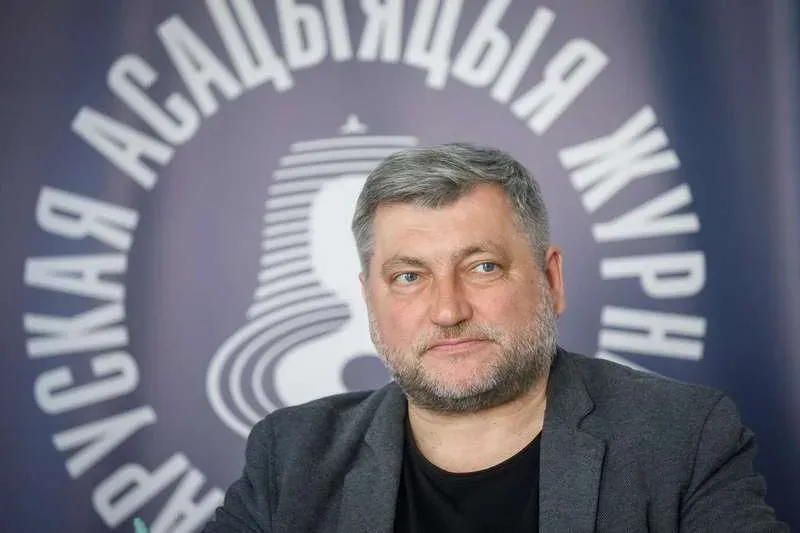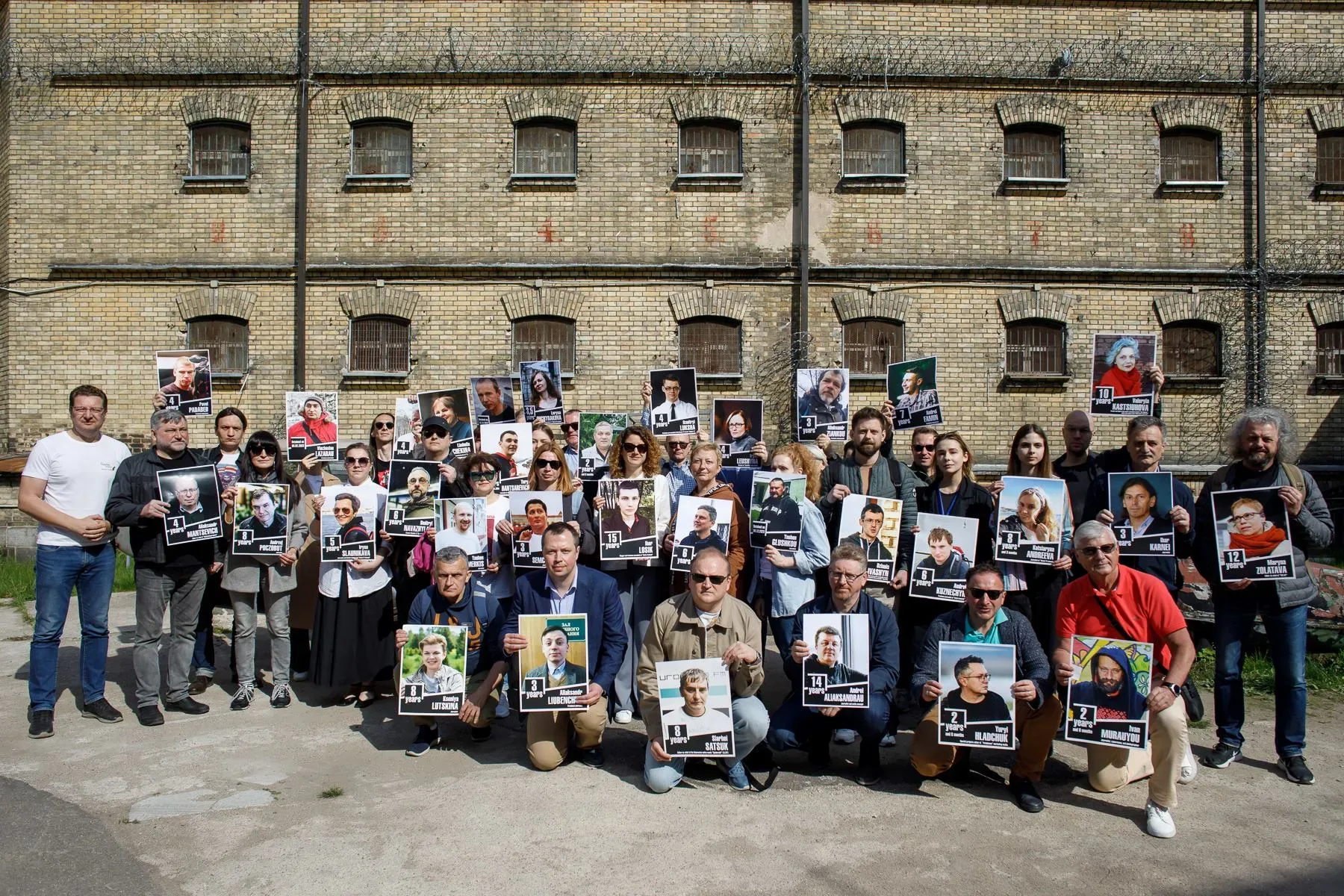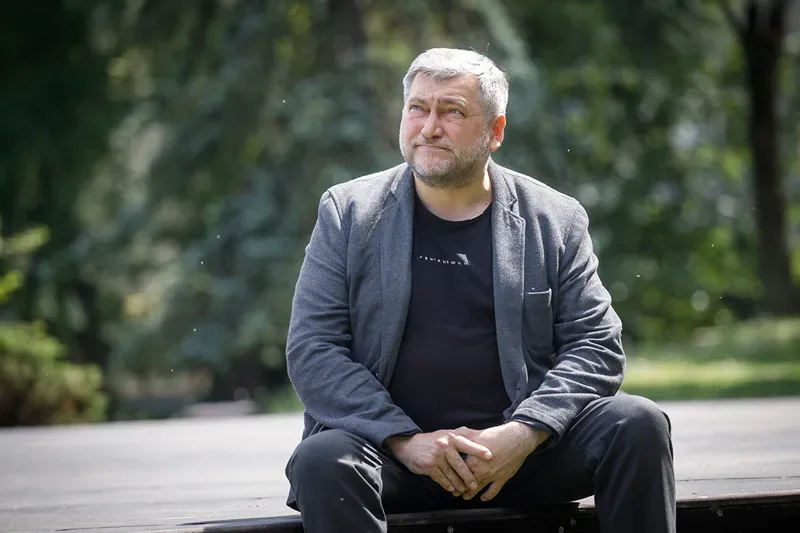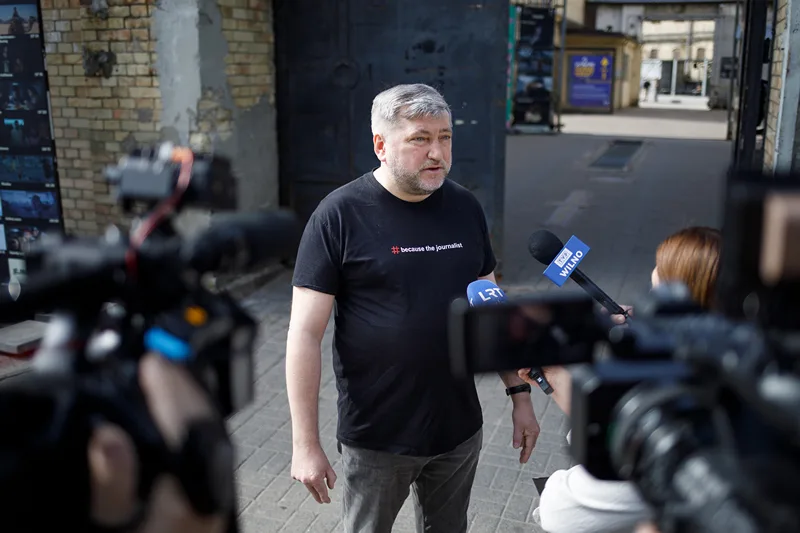“Human rights are my religion.” Interview with BAJ chair Andrei Bastunets on the eve of the 30th anniversary of the organization
Next year marks a milestone for the BAJ, which celebrates its anniversary in exile.
“I truly believe in the mission of our organization. This is what keeps me going,” says BAJ chairman Andrei Bastunets. In the interview, he talks about how the organization has grown, shares his thoughts on the Belarusian media sector, discusses journalistic standards, and uncovers what media he starts his day with.

Andrei Bastunets, Chairman of the Belarusian Association of Journalists. Photo credit: BAJ
“We have healthy competition and cooperation with the Press Club”
How has the BAJ changed over these 30 years?
I started at BAJ as a part-time lawyer in the late 1990s. As Vladimir Vysotsky’s song goes, “You’ll grow from foreman to minister.”
Most of the BAJ staff, including me, worked part-time back then. Some worked full-time at a radio station or a newspaper. At BAJ, they met and discussed professional rights issues.
Recently, I realized that no one person in the organization has remained from those times.
Now BAJ has a website and social media – it has become our routine and an important part of how the organization works. But when the site was launched, only two people ran it.
In the early 2000s, we established a relationship with the International Federation of Journalists. They visited us to see how BAJ was doing. We began to talk about the pressure on the media and the warnings they received from the Ministry of Information. And they replied, “We’re not asking you about freedom of speech in the country, but about what the organization is doing.” That’s when we started thinking about it and our internal system. Gradually, the BAJ became more professional, both in the way the staff understood and performed their work and in the fact that the work of the BAJ became their primary job, as it did for me after a while.
BAJ was established as a human rights organization. At one time, BAJ representatives could participate in criminal and administrative proceedings. Then, as time went on, the legislative level gradually closed these possibilities, but there were still economic cases – appeals against Ministry of Information warnings or defamation actions.
That was a prosperous period when two-thirds of all cases in which BAJ lawyers participated ended in favor of the media sector.
But at some point in 2002, the Chief Justice said that the courts had learned to resist public pressure. The situation has changed dramatically since then. In fact, there isn’t a single court case where the media has won against the state. In over twenty years, this has led to the complete collapse of the legal system in Belarus.
What is one thing about BAJ that you are particularly proud of?
For sure, it is our colleagues and partners with whom we work internationally. Of course, I am proud of the awards we’ve received. Among the most important are those from the World Association of Newspapers in 2003 and the 2004 Sakharov Prize of the European Parliament. Among the latter awards we received, it is the UNESCO Prize. BAJ was recognized by the Eastern Partnership Civil Society Forum in 2023 for its outstanding and dedicated work. We realize that this is not only a tribute to BAJ but, first and foremost, a tribute to the entire field of journalism.
One of the most colorful traditions was holding BAJynki, an equivalent of the state-sponsored harvest festival Dazhynki. It was a cultural event where, on the one hand, we discussed serious problems and, on the other hand, we relaxed and played.
Today, we are exceptionally inspired by one action – the Solidarity Marathon with Imprisoned Journalists. It has been held in over 20 countries on five continents and counting. We care about our incarcerated colleagues and don’t let them be forgotten.

Solidarity action with politically imprisoned journalists. Lukiškės Prison, Vilnius, May 3, 2024. Photo credit: BAJ
Did the BAJ have any lapses?
I can’t think of any big, fundamental mistakes. Of course, there were arguments, conflicts, and misunderstandings.
There are probably some things we could have done better at. But overall, we’ve always stayed true to our mission: listening to the voice of the journalism community.
For a long time, BAJ was the only professional journalistic organization in Belarus. Then the Press Club appeared. How do you view such competition?
The BAJ and the Press Club are now geographically separated: we are based in Vilnius, and they work in Warsaw. This does not, however, diminish the level of cooperation that exists. The competition is healthy. We coordinate our work and jointly organize the educational course “Journalistic Faculty on Saturdays.” Part of the project is carried out by BAJ in Vilnius, another part is the responsibility of the Press Club in Warsaw.
“I’m introverted and have social anxiety”
Have you ever thought about wanting to lead the organization?
No, I didn’t. I was asked to accept this position well in advance of the 2015 BAJ Convention. I felt very comfortable as deputy chair and director of the legal division. Becoming chairman would have been a significant job change and increased my workload. So, I declined the role twice before previous conventions. But in 2015, refusing was no longer an option, and I agreed to run for office.
Next year marks your 10th year leading BAJ. Have you ever thought of resigning?
Of course, I have. I initially expected a maximum of two terms.
But in 2021, when the BAJ Convention was held, after the first wave of searches and arrests of the office, we decided that I could resign, thus destroying the structure. We saved the organization, which allowed us to recover more quickly from relocation.
I don’t know what will happen next. Last year, the BAJ board decided to hold a convention when the opportunity arose. We discuss this issue again every year.
As a manager, how do you maintain trust in your employees?
Managing is, first and foremost, about communicating. And I am just a very shut-in person, even somewhat introverted with social anxiety. I am thankful to have people around me to help with communication. They don’t need to be motivated.
It’s different with other employees. The next generation looks at life differently, they have different priorities.
Now, the organization has resumed a training course for BAJ leaders. The aim of this course is to pass on the organization’s values to the youth. We want to show that there is more than just PTSD and not knowing what lies ahead about this job.

Andrei Bastunets, Chairman of the Belarusian Association of Journalists. Vilnius, 2023. Photo: BAJ
The last BAJ Convention was in 2021, and it was held in Belarus. The makeup of BAJ’s elected bodies and our journalism have changed a lot in four years. Do you think the BAJ should be reformed and its board reconstituted?
There is some legal nonsense going on here. We declare that we act according to the BAJ Statute and the established documents. However, the Belarusian authorities recognized these documents as invalid, so the organization does not exist de jure.
We follow all procedures outlined in these documents to the extent possible. Lacking the legal presence in this context, it is noteworthy that we continue to operate by established rules and regulations.
This is a challenge faced by all civil sector organizations. To date, the journalistic community has not requested reform of our current operational structure. Conversely, we feel supported and remain a recognized organization representing common interests.
“Traditional journalism standards are reconsidered”
What media do you read or watch?
My mornings start with the weather forecast, then the BBC. After that, I browse several Belarusian independent media sites and the BAJ website. Although I monitor the propaganda occasionally, I may not have enough time to read the Belarusian state-sponsored media. Of course, I don’t feel compelled to read any of the above.
Sometimes, I watch pieces on YouTube. I’m not too fond of formats that last an hour and a half; short videos are more interesting to me.
Recently, BAJ conducted a poll on its Telegram channel: “Over the past year, has the Belarusian independent media sector as a whole shown stagnation or development?” The majority – 58% of respondents – replied “stagnation.” What is your opinion?
What Belarusian media does can be compared to running on a treadmill. You have to move forward in order not to go backward. Independent media are actively developing and using new formats.
The current situation facing the media is a significant challenge. Media outlets are working in exile, facing the risk of being labeled as extremist formations. Audiences are discouraged from engaging with content, including subscribing, sharing, and liking.
Traditional journalism standards are reconsidered. Some of them are no longer feasible. For example, trying to get all sides to comment, especially when it comes to Belarusian governmental agencies, or protecting the anonymity of experts who comment without identifying themselves. It is against all standards.

BAJ chairman Andrei Bastunets at a rally in solidarity with imprisoned journalists. Lukiškės Prison, Vilnius, May 3, 2024. Photo credit: BAJ
We have proposed creating a new journalistic self-governing body that will not be directly affiliated with the BAJ. The media outlets that wish to participate in this process will choose their representatives. It’s an ambitious plan. I don’t know if that will happen, but we’re considering the possibility. A great deal will depend on whether or not the opinion of this body will be authoritative for the journalistic community.
What gives you the strength to do the work?
I truly believe in our organization’s mission. That’s what keeps me going, as well as the colleagues I work with and those who are behind bars. Some of them are my friends.
Human rights are my religion; they motivate me to do what I do. Journalists’ rights are based on freedom of expression, which is not only a fundamental right but also underpins all others.
Are there any celebrations planned for BAJ’s 30th anniversary?
It would be good to mark this important date with some event. However, our current planning horizon is relatively short, and the global situation is not conducive to celebrations. Everything will depend on events in Belarus and beyond.
 @bajmedia
@bajmedia
